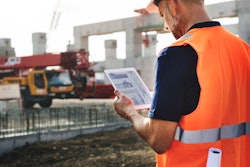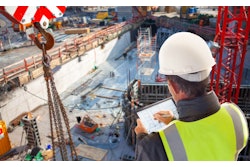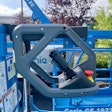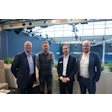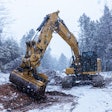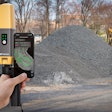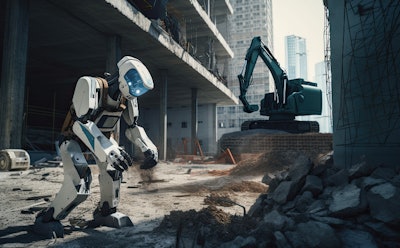
When you look at a modern factory floor, repeatable motions and actions make it easy to imagine how a robot could step in and complete those tasks. And with a well-organized warehouse it’s also logical that a machine would provide a viable option to move items from point A to point B.
It even makes sense to see your food being delivered at a restaurant by a friendly robot as that too is a known, consistent layout of space. But when it comes to the built world - construction sites specifically - these environments are truly dynamic, continuously evolving with each day as the project progresses.
Beyond the very first actions taken at a given construction site (digging a foundation, pouring cement, tying rebar) these complex physical environments are simply too involved for robots. It’s more likely that it will take 50 years before robots are capable of fulfilling the vast majority of tasks that we depend on today’s skilled workforce to complete.
A few months ago in The Washington Post I read an article that highlighted the crisis in today’s construction industry (These Robots Might Build Your House). The key takeaways as I interpreted the article, were that demand for building is driving innovation in the “contech” sector and the industry’s vast amount of open roles are forcing the ascent of robots to work alongside skilled workers to more effectively complete these vital jobs. The key word being work alongside versus today’s popular narrative that AI and robots are going to replace jobs. While that replacement narrative may prove to be the case for some (or many!) knowledge-based roles, I firmly believe that we are a long way off from any job replacement risk in construction.
Before I transitioned my career into tech entrepreneurship I was a skilled worker myself. I practically grew up with a tape measure in one hand and a hammer in the other. I loved building things so I know what a day’s work truly looks like for a craft worker and no two days or job sites ever looked the same. The sheer variability of the locations, sites, scale of projects, vendors and more truly make these workplaces unique, which can’t be pre-programmed and automated by a crew of toolbelt wearing robots.
When you read about disruption coming to the workplace (ChatGPT May Be Coming for Our Jobs), nine times out of ten that potential displacement is for desk workers, who are responsible for writing, calculating, coding, analyzing, etc. When you hear about automation being applied to deskless workplaces - say an aircraft cockpit - typically the argument is to provide safer working conditions for humans or the alleviation of the mundane.
But when you ask a pilot why they became a pilot it’s typically because they love to fly planes, it’s an element of them feeling alive. And they didn’t stop flying when auto-pilot was introduced, they adapted and leveraged it as a tool that made them better pilots. Skilled workers - long overlooked and underserved by technology when compared to desk workers - are more akin to pilots than marketing managers. Very few would argue they swing a hammer or weld a pipe solely for the money - they are passionate about creating something with their hands, building a site where the next great invention is realized, a piece of legislation is passed, or a child is born.
We are at the front of a massive wave of building (global building floor space is expected to double by 2060), when new and existing skilled roles will be in high demand. Between economic stimulus, infrastructure needs, the clean energy transition and other tailwinds in our industry the next several decades will see massive growth in the construction industry. Human capital is at the core as people will be the key to unlocking the business growth that top construction firms desire.
Simply put, robots and AI aren’t mature enough today to serve the demand in the build world. My perspective is that by the time robots are capable of navigating dynamic workplaces this current boom in building will have subsided to some degree - it’s that far off. Will there be interesting innovations that help skilled workers accelerate their output? Yes. Will there be hardware that augments the skilled workers to reduce fatigue? Maybe. But like most workers today - desked or deskless - skilled laborers don’t want to be displaced by the rise of robots. The difference for skilled workers is that the dynamism of their roles, which make them unique – certainly not jobs everyone can do – is the very thing that will protect those jobs long into the future.
Does this fact mean that we’ll see a shift in people moving away from the types of education that have long been worshiped as the key to upward mobility in favor of training that will give them opportunities that are fundamentally more resilient in the face of rapidly advancing automation? I hope so. Might we see people getting back to working with their hands, not just their fingertips in order to contribute long-term to their worlds? I hope for that as well.
For those saying that the answer to fewer people entering the construction talent pool is to create expensive, point-solution robots, my response would be that this is an incredible industry full of skilled workers with great pride in their contributions to projects large and small. Instead of trying to scare them that their jobs are at risk, let’s help them understand that the very nature of the work that attracted them to their field is the thing that will ensure they have roles long into the future. Perhaps that will make the talent pool grow and gain the respect it deserves.
ABOUT FRASER
Fraser Patterson is a repeat contech founder, skilled tradesman, general contractor, educator and mentor. In 2021 Fraser founded Skillit, a skills-based, data-driven platform that provides mid-market and large ENR contractors access to qualified, skilled workers nationwide and a suite of worker-first hiring tools.
Before Skillit, Fraser was the co-founder and CEO of Bolster, a tech-enabled design-build company and OnisVida, a remodeling platform that helps homeowners manage remodeling projects. Fraser began his career as an apprentice carpenter in Scotland before starting a general contracting firm in London.

